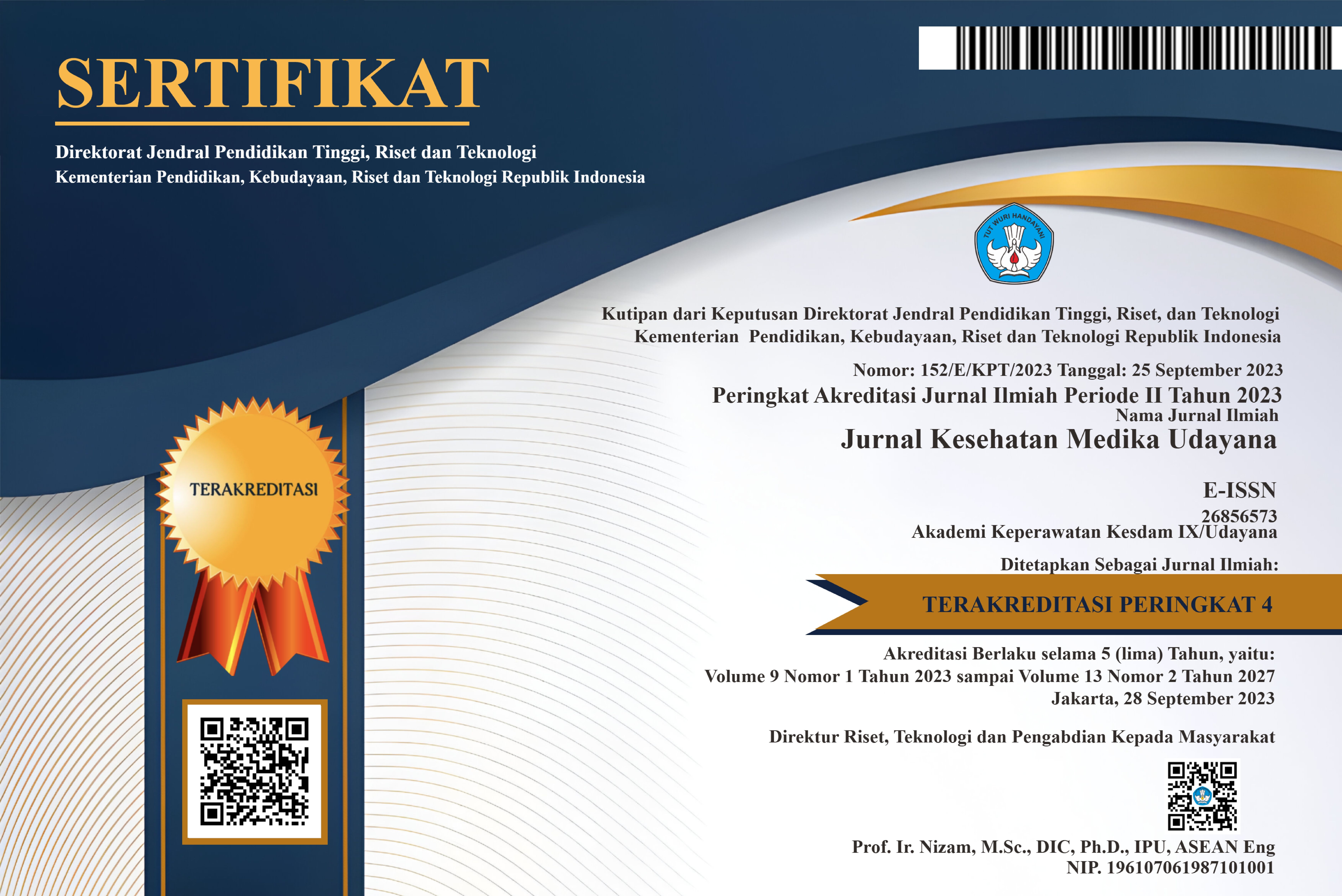GAMBARAN TINGKAT KECEMASAN PADA PASIEN STROKE DI RUANG BELIBIS RSUD WANGAYA DENPASAR
DOI:
https://doi.org/10.47859/jmu.v4i1.133Keywords:
Anxiety Level, Stroke PatientsAbstract
Background: Stroke is a major cause of disability in adults, where four million Americans experience neurological deficits due to stroke, two-thirds of these deficits are moderate to severe. This disease has become a worldwide health problem and is increasingly important, with two-thirds of strokes now occurring in developing countries. Stroke sufferers themselves will experience a psychological response, namely anxiety because in addition to being a life threat, patients will feel anxious about their future. The purpose of this study was to determine the description of the level of anxiety in stroke patients in the Belibis Room of Wangaya Hospital Denpasar. Methode: The type of design used is descriptive design. Data collection was carried out by the researchers themselves using a standard questionnaire sheet, the Hamilton Anxiety Rating Scale (HARS), with the number of respondents 30 people who were Stroke patients in the Belibis room of Wangaya Hospital Denpasar. Result: The results of this study indicate that the majority of stroke patients in the Belibis room of Wangaya Hospital Denpasar experienced moderate anxiety, namely as many as 17 (56.7%) respondents, mild anxiety as many as 6 (20%) respondents, severe anxiety as many as 6 (20%) respondents, panic 0%, and only 1 (3.3%) respondents who did not experience anxiety. Conclusion: Individuals who experience anxiety are mostly aged over 50 years, female sex, high school education, and have private jobs. It is expected that families can provide motivation and positive encouragement to patients.
Keywords: Anxiety Level; Stroke Patients
References
Carpernito. (2000). Buku Saku Diagnosa Keperawatan, Edisi 8. Jakarta: EGC.
Doengoes, M.,dkk. (2000). Rencana Asuhan Keperawatan & Pedoman Untuk Perencanaan dan Pendokumentasian Perawatan Pasien. Edisi III. Jakarta: EGC
Horney. (1994). Penyebab Kecemasan (online). Tersedia di: http//www.penyebab kecemasan dan pengaruhnya/kepribadian.co.id
Long, Barbara C.(1996). Praktek Perawatan Medikal Bedah ( Suatu Pendekatan Proses Keperawatan ). Bandung: Yayasan Alumni Pendidikan Keperawatan
Long, B. C. (2001). Keperawatan Medikal Bedah, Edisi dua, alih bahasa Yayasan Ikatan Alumni pendidikan Keperawatan Universitas Padjajaran Bandung.
Nursalam. (2003). Konsep & Penerapan Metodologi Penelitian Ilmu Keperawatan. Jakarta : Salemba Medika
Okti. S.P. (2004). Kepatuhan Klien Post Stroke dalam Melaksanakan Mobilisasi Dini di Ruang Rawat Inap Rumah Sakit Umum Daerah Purworejo, Skripsi tidak diterbitkan, Program Studi Ilmu Keperawatan Universitas Gajah Mada, Yogyakarta.
Swartz, M, H. (1995). Buku Ajar Diagnostik Fisik, Buku 1. Jakarta: Penerbit Buku Kedokteran EGC
Valery. F. (2002). Stroke, Cetakan Kedua. Jakarta: PT. Bhuana Ilmu Populer.







